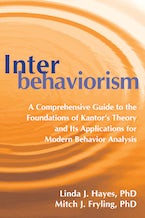By Linda J. Hayes, PhD and Mitch J. Fryling, PhD, coauthors of Interbehaviorism
Feelings from an Interbehavioral Perspective
Feelings are important to consider not only because they are so much a part of our day-to-day lives, but also because they have several unique features relative to psychological events more generally. We turn now to these features and Kantor’s analysis of feeling events. We begin by reviewing the most distinguishing feature of feeling events, namely their affective character. The affective character of feeling events accounts for their pervasiveness, including their extension over time. Finally, we consider feeling events to be a type of cultural happening and describe their conventional nature in humans who engage in linguistic activities.
Feelings Are Affective Actions First
And most fundamentally, feelings require us to distinguish between affective and effective actions. Feelings are affective actions. They differ from effective actions in the sense that affective actions don’t result in a change in the stimuli to which they occur. Rather, feelings result in changes in the reaction systems of the individual. Put another way, effective actions change the environment in some way, whereas affective actions change the reaction systems of the individual in some way.
For example, when another driver attempts to cut us off in traffic, we might honk the horn, which, in turn, may have an impact on the other driver. This would be an effective action in the sense that it Interbehaviorism brings about a change in the stimulating environment. By contrast, we may also feel afraid or angry upon being cut off. The feeling action doesn’t change the stimulating environment in the same way as an effective action does. Rather, it changes the reaction systems of the behaving individual. For example, our muscles may become tense and our heart rate may be elevated.
These changes in our reaction systems may be accompanied by changes in other actions, including those of an effective type. The dynamic and topographical properties of our speech may change, for example. The point is that feelings don’t effect changes in the environment directly. Similarly, we may ask a friend for a hug after not seeing them for a long time. This request may be considered an effective action in the sense that it results in the friend giving us a hug. This is contrasted with the feeling of happiness or closeness with the friend, which is affective and changes our reaction systems. Importantly, while we are indeed referring to some visceral happenings here, we are not suggesting that feelings are these visceral happenings. This is an important issue for us to be extra clear on, as suggesting that feelings are glandular activities would be confusing feeling actions with their effects on the biological conditions of the individual (Hayes & Fryling, 2017). This affective character of feeling events is by far the most distinguishing and significant feature of feelings.
Linda J. Hayes, PhD, is a Distinguished International Professor at the University of Nevada, Reno. She cofounded the behavior analysis program at the University of Nevada, Reno; and has served two terms as president of the Association for Behavior Analysis International.
Mitch J. Fryling, PhD, is professor and associate dean in the college of education at California State University, Los Angeles. He has authored many scholarly publications, primarily in the area of behavioral theory and philosophy. He is current editor of The Psychological Record.



 2024 Peace Playbook: 3 Tactics to Avoid Clashes with Your Partner
2024 Peace Playbook: 3 Tactics to Avoid Clashes with Your Partner